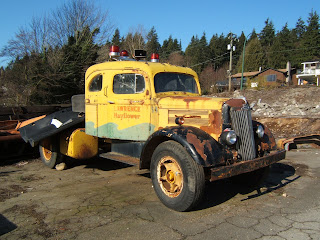
I like old rusty vehicles, like this one off the Dollarton. It's an abandoned wreck, but that doesn't mean it never had value. Wrecking things is problematic, especially if it involves vandalism or wanton destruction (rather than effectively targeted destruction such as occurs in house renovations). Wrecking things denotes violence. However, wrecking weak ideas should always be encouraged, particularly if you replace them with more robust ones.
When you find weak ideas, attack them, critique them, squash them. Find the flaws and magnify them so that other people can also see the cracks in their foundations. The authors or speakers of the ideas being demolished, if they are true thinkers who believe in intellectual pursuits, will thank you for it, rather than being defensive, resentful, or insulted. They may try, in turn, to take the wrecking ball to your ideas. This should be welcomed and celebrated, since it's what happens when people are engaged and feisty thinkers! If you aren't willing to risk the vulnerability that inevitably comes with putting your thoughts out there in the world for intense scrutiny, then how will you ever improve and develop your own intellectual prowess?

